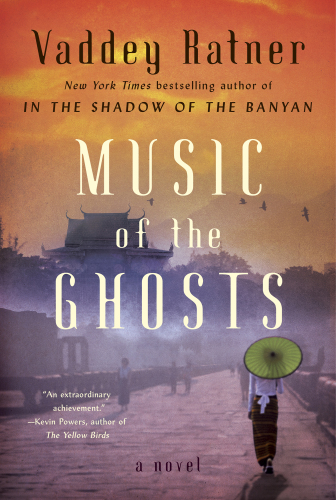
Music of the Ghosts
A Novel
کتاب های مرتبط
- اطلاعات
- نقد و بررسی
- دیدگاه کاربران
نقد و بررسی

February 6, 2017
Picking up many themes from her 2012 In the Shadow of the Banyan, Ratner’s captivating novel is a tragic odyssey of love, loss, and forgiveness in the wake of unspeakable horrors. In 1979 Suteera Aung and her aunt Amara are forced to flee Cambodia during the Khmer Rouge regime as war rages around them. In a chilling admission as she and her fellow refugees fight to escape their once-beloved homeland, Suteera states that “there is no more home, only this land of open graves.” Years later, after receiving a letter from a man known only as the Old Musician, Suteera is pulled back to the country that holds the terrors of her past. She learns that the old man and her father had spent time in the same jail, originally as enemies but eventually as friends. Suteera believes the mysterious musician can help her understand why her father, like the rest of her family, became consumed by the gaping, vicious mouth of war. As the title suggests, the songs and stories of ghosts fill the pages of this novel. Ratner, who lived through the rule of the Khmer Rouge herself, weaves a moving tale of hope and heartbreak that will accompany readers long after they finish the last page.

Starred review from February 1, 2017
Ratner (In the Shadow of the Banyon, 2012), a survivor of the Khmer Rouge years in Cambodia, has written a novel-length smot, a form of "poetry sung in honor of loved ones, living or dead." As in two other recent novels concerning life under communist regimes--Elizabeth Kostova's The Shadow Land, about Bulgaria, and Madeleine Thien's Do Not Say We Have Nothing, about China--music is central to this tale. In 1979, 13-year-old Suteera and her aunt Amara escaped Cambodia, the only members of their family to survive. Despite the comfortable lives they achieve in America, Suteera, now called Teera, remains haunted by the mystery surrounding her father's early disappearance. After Amara's death in 2003, 37-year-old Teera flies to Cambodia to visit Wat Nagara, a Buddhist temple where her aunt bequeathed a memorial to all who perished during the Khmer Rouge years. Coincidentally, Teera has recently received a letter from a stranger offering her musical instruments he claims her father gave him while they were imprisoned together. The stranger is Tun, a former musician weighed down by enormous guilt over choices he made during the war years and deep grief over the daughter he lost. Now poor and disabled, he lives at Wat Nagara, where he heard about Teera from the abbot. Teera and Tun's awkward first meeting stirs up memories for each. Meanwhile Teera begins a love affair with Tun's friend Dr. Narunn, a former novice monk who runs a medical clinic. Also orphaned during the war years, Narunn chooses to embrace life despite his difficult past. The novel is organized in three movements: the first is a careful exposition of grief and unresolved remorse as themes; the fast-tempoed second covers a period of months as the characters interact with each other while remembering individual pasts of "so much cruelty, so much generosity"; the third resolves the initial themes while attaching hope--for the human characters and possibly Cambodia, Ratner's true central character. Lush with tropical heat and heated emotions, this is no easy read but impossible to put down.
COPYRIGHT(2017) Kirkus Reviews, ALL RIGHTS RESERVED.

November 1, 2016
Following her 2012 debut, the New York Times best-selling In the Shadow of the Banyan, Ratner returns us to Cambodia, where perpetrators and victims of atrocity dwell together uneasily. Twenty years after fleeing the country, Teera has received a letter from a stranger claiming to have known her father at Slak Daek, Pol Pot's blood-soaked security prison. Meeting him will compel her to weigh crucial issues of forgiveness and justice. I'm especially anticipating.
Copyright 2016 Library Journal, LLC Used with permission.

























دیدگاه کاربران